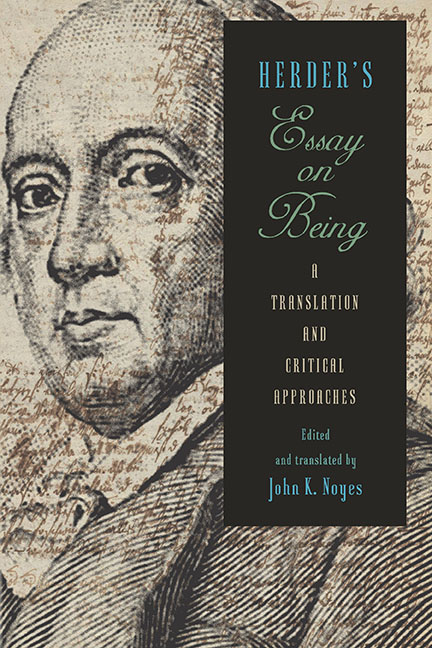Book contents
- Frontmatter
- Contents
- Acknowledgments
- List of Abbreviations
- Introduction: The Essay on Being
- Part I Versuch über das Seyn, by Johann Gottfried Herder
- Part II Critical Essays
- Herder's Essay on Being
- The Order of Being and the Order of Ideas: The Historical Context of Herder's Essay on Being
- Indivisible, Inexplicable, and the Center of All Certainty: Herder's Concept of Being
- The Metaphysical Foundation of Subjective Philosophy in Herder's Essay on Being
- Herder's Kantian Critique of Kant on the Concept of Being
- Attempting to Place the Essay on Being
- Herder's Early Neoplatonism
- Being, Possibility and God: A Comparison of Herder and Heidegger
- Bibliography
- Notes on the Contributors
- Index
Herder's Early Neoplatonism
from Part II - Critical Essays
Published online by Cambridge University Press: 13 April 2019
- Frontmatter
- Contents
- Acknowledgments
- List of Abbreviations
- Introduction: The Essay on Being
- Part I Versuch über das Seyn, by Johann Gottfried Herder
- Part II Critical Essays
- Herder's Essay on Being
- The Order of Being and the Order of Ideas: The Historical Context of Herder's Essay on Being
- Indivisible, Inexplicable, and the Center of All Certainty: Herder's Concept of Being
- The Metaphysical Foundation of Subjective Philosophy in Herder's Essay on Being
- Herder's Kantian Critique of Kant on the Concept of Being
- Attempting to Place the Essay on Being
- Herder's Early Neoplatonism
- Being, Possibility and God: A Comparison of Herder and Heidegger
- Bibliography
- Notes on the Contributors
- Index
Summary
NEOPLATONIC PHILOSOPHY was transmitted without interruption from its founder Plotinus (ca. 203–69 CE) into what is generally refered to as the age of Goethe (ca. 1750–1850). In this era, Herder is its most important mediator. I shall show here that, from his earliest writings on, Herder thinks in the categories and structures of Neoplatonism. In several publications I have traced the influence this had on Goethe and the students of Kant and Fichte. My point of departure was the fact that, up until Schleiermacher's translation, Plato was known in the Germanspeaking countries by way of the Neoplatonic translation into Latin and commentary of Marsilio Ficino (first published 1484). In addition, Hamann, Herder, Goethe, Hardenberg, and other contemporaries are known to have studied Plotinus and Proclus.
“Imagine my luck. Have obtained a magnificent edition of Plato for 31 fl. and the best of Proclus’ and Plotinus’ theol. works. Text and translations,” Johann Georg Hamann reported joyfully on December 19, 1761. He immediately began a systematic study of the Neoplatonically interpreted dialogues of Plato. Herder, a student of Kant since 1762, met Hamann in the beginning of 1764; inspired by Hamann, Herder wrote the Essay on Being, in which he challenged Kant's attempt at an ontological proof of God and arrived at a result that Kant himself did not apply until 1781. Herder presented a counter-argument that clearly took its bearings from Plotinus. The master was not amused: “Kant too appears utterly withdrawn [retiré] towards me,” Herder wrote. In the course of his life Herder acquired a complete Platonic-Neoplatonic library.
Goethe, who became acquainted with Neoplatonic philosophy through Hamann, whose works he collected, and through Herder, developed his “private religion” in 1770–71, as he described in retrospect, “Neo-Platonism was its basis; Hermeticism, mysticism, and cabalism also contributed something, and so I built myself a very strange-looking world.” Later he returned to Plotinus repeatedly. In 1805 he translated a part of the Enneads, which was of importance for his aesthetics, and referred to Plotinus in the introduction to the didactic part of Zur Farbenlehre (Color Theory, 1810), to the “words of an old mystic writer, which may be thus rendered, ‘If the eye were not [sunlike] [sonnenhaft], how could we perceive light? If God's own strength lived not in us, how could we delight in Divine things?’”
- Type
- Chapter
- Information
- Herder's Essay on BeingA Translation and Critical Approaches, pp. 162 - 182Publisher: Boydell & BrewerPrint publication year: 2018



